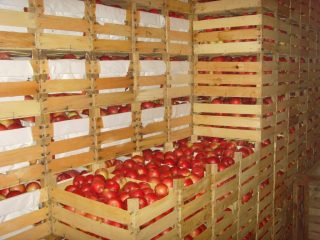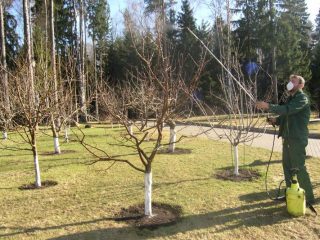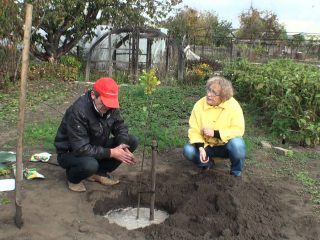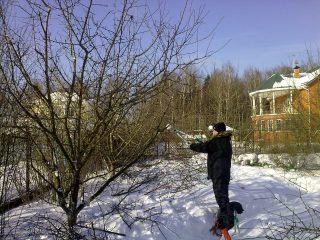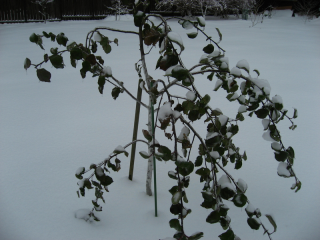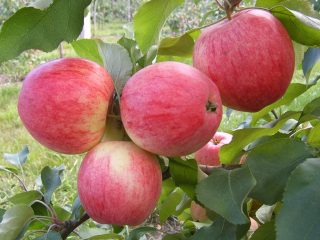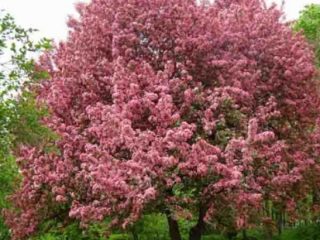Content
The Auxis apple tree variety is distinguished by its productivity. It is intended for cultivation in central Russia or in the south. This is a product of Lithuanian selection. Scientists were given the task of breeding an apple tree with large and juicy fruits. To do this, trees require cross-pollination. The apple tree does not produce much fruit on its own.

Auxis is picky about growing conditions
History of selection
At the Agricultural Institute of Fruit and Vegetable Farming of Lithuania, work was carried out to breed the Auxis apple tree. To do this, they crossed Mackentosh and Grafenstein red. The new variety has inherited the best qualities and some of the negative ones. Auxis is grown not only in Lithuania, it has gradually spread to other European countries.
Characteristics of the apple tree variety Auxis
Before buying a seedling for cultivation, it is better to familiarize yourself with the characteristics of the apple tree. This will help you evaluate your own strength in growing.
Appearance of fruit and tree
From the photo description of the apple variety and the Auxis tree, you can see that it is tall, reaches a height of 4-5 m. The crown is wide and rounded. The leaves are elongated, dark green, the bark is gray-brown.

To grow Auxis you need pollinators.
The fruits of the apple tree are large in size, maximum weight 180 g. The fruits are pink-green in color. The blush is located on the surface in the form of a chaotic web. The skin is smooth, dense, and has a waxy coating.

Fruit begins to set in early June
Lifespan
The Auxis apple tree lives 20-25 years. To maintain fruiting, rejuvenating pruning is carried out. The tree begins to produce less fruit after 10 years of activity. The fruits will become smaller and their number will decrease.
Taste
Inside, the apples are white-yellow in color, the flesh is juicy, dense, and emits a pleasant aroma. The taste is high, sweet with a slight sourness. According to tasters, Auksis received a mark of 4.5 out of 5 possible points. Apples are suitable for making dried fruits and eating fresh. The fruits contain a large amount of useful minerals and vitamins.

Auxis fruits fall off if they are not collected in time
Growing regions
Suitable for growing in temperate continental climates. In Russia, the tree grows in the middle zone and in the south. In the north, an apple tree may not survive the winter, but if you create a good layer of insulation, this is possible.
Productivity
The apple tree variety Auxis is a high-yielding variety. Up to 50 kg of apples are harvested from one tree per season. However, under unfavorable growing conditions, the yield decreases.
Frost resistance
The tree can withstand temperatures down to -25 0C. Frost-resistant properties appear by the 5th year of life. Young seedlings must be insulated for the winter, regardless of the growing region. Use mulch and breathable materials, cover the root area and top.
Resistance to diseases and pests
Auxis has strong immunity. The apple tree is resistant to the following diseases and pests: scab, rust, fruit rot, red mite, leaf roller, cytosporosis.
In rare cases, the tree may become sick. This occurs due to high humidity, excess or lack of fertilizers, as well as improper care.
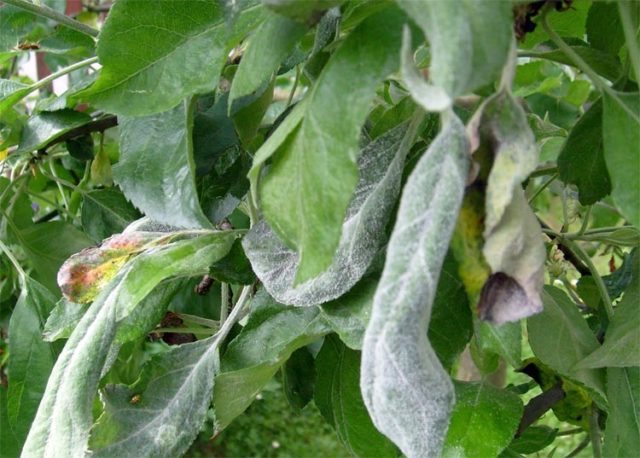
Rarely, the Auxis apple tree is affected by powdery mildew.
Flowering period and ripening period
The first buds appear in early May. Towards the end they completely bloom, fruit formation occurs. The fruits ripen at the end of August. They must be collected within 14 days before they fall off.
Pollinators for apple trees Auxis
To successfully bear fruit, a tree needs a pollinator. Cross-pollination causes apple trees to set fruit. The following varieties are suitable: Melba, Antonovka ordinary, Aksamit, Grushovka Moskovskaya, Konfetnoe, Mackintosh, Zhigulevskoe and others.
Any varieties of apple trees with the same ripening period as Auxis are suitable.
Transportation and keeping quality
According to reviews, the Auxis apple variety is a shelf-stable variety. Fruits are stored until February in a cool place. Apples can last in the refrigerator until March. The fruits have a dense structure and are easy to transport.Suitable for sale and independent use.
Advantages and disadvantages
The Auxis apple tree has its advantages:
- high productivity;
- mid-ripening;
- high taste qualities;
- transportability;
- keeping quality;
- frost resistance;
- strong immunity.
Among the shortcomings, the tree is whimsical to favorable growing conditions. If you do not feed, overwater or overdry the plant, it will immediately let you know.
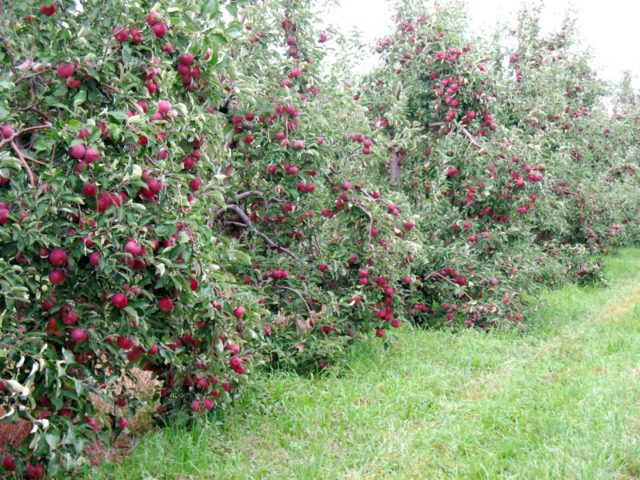
It is necessary to monitor the condition of the tree to get a high yield
Landing rules
Young seedlings are purchased from a nursery, which can guarantee the quality of the tree. Apple trees take root better when planted for the winter. Step-by-step instruction:
- Dig a hole 1 m deep and 70 cm in diameter.
- The soil from the pit is mixed with humus and mineral fertilizers.
- Soak the roots of the seedling for 24 hours in a manganese solution.
- Lower it into the hole and straighten the roots.
- Sprinkle the roots with soil in layers.
- Form a trunk circle with a diameter of 30 cm.
- Water the seedling with 15 liters of water.
- Cover with a layer of mulch.
- The top is insulated with spandbond or agrofibre.
- Leave until spring.
The seedlings quickly take root; by the beginning of the season, the growth will be 50 cm. By the third year of life, the tree will begin to bear fruit.
Growing and care
Caring for an apple tree includes several manipulations:
- watering;
- feeding;
- mulching;
- wintering;
- treatment against diseases and pests;
- pruning
If all agrotechnical work is carried out on time, the apple tree harvest will be rich.

Auxis quickly takes root in a new place
Watering
Irrigation is carried out 4 times per season, if there is no drought and heavy rains:
- During the budding period.
- During fruit set.
- During the fruiting period.
- After the harvest.
One apple tree requires at least 30 liters of water.Water the plant in the tree trunk area.
Top dressing
Fertilize the apple tree along with watering. They use ready-made mineral complexes and organic compounds:
- humus;
- manure;
- chicken droppings;
- wood ash;
- herbal decoctions;
- copper sulfate;
- phosphate rock;
- potassium salts;
- nitrogenous fertilizers.
Fertilizers are placed at the root. Cover with mulch on top so that they are absorbed faster.
Mulching
Plays the role of a protective layer of the root system, retains moisture, and helps to survive the winter. Straw, moss, tree bark, fallen leaves, humus, and chopped grass are used as mulch.
It is important to mulch your apple tree before winter begins. It additionally warms the roots under a layer of snow.
Wintering
For the winter, young seedlings are covered entirely, using spandbond, agrofibre and other breathable materials. The roots are mulched.

Mulch retains moisture, which prevents the tree from drying out
Treatment against pests and diseases
Fungicides and insecticides for fruit trees are used for this purpose. The chemicals are completely eliminated within 21 days. The first treatment is carried out during the budding period, repeated as necessary.
Trimming
Pruning is carried out annually. The first 5 years form the crown of the apple tree. In the first year, the central branch is cut off, in the second - two main shoots, in the third - four. In summer, thickened areas are thinned out. After harvesting, remove broken and damaged branches.
Collection and storage
Harvest 2 weeks before full ripening. The procedure is carried out at the end of August. Apples are green in color and have a deep crimson blush at this time. The fruits are carefully removed from the trees, preventing them from falling.If the harvest is not carried out in a timely manner, the fruits fall off.
Store the harvest in a cool place, for example, in a cellar or on a balcony. Apples are laid out in plastic or wooden boxes in one row. Periodically inspect the fruits, remove spoiled and rotten ones.

Auxis fruits have a dense structure, so they store well
Conclusion
The Auxis apple tree variety is excellent for growing in central Russia. If all rules of agricultural technology are observed, the tree produces high yields. The fruits have good qualities and can withstand transportation. Auxis is grown on an industrial scale for processing. Many gardeners keep this variety for personal use.
Reviews
